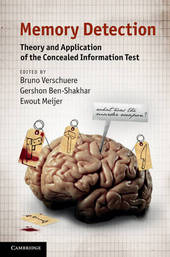
|
Memory Detection: Theory and Application of the Concealed Information Test
Hardback
Main Details
| Title |
Memory Detection: Theory and Application of the Concealed Information Test
|
| Authors and Contributors |
Edited by Bruno Verschuere
|
|
Edited by Gershon Ben-Shakhar
|
|
Edited by Ewout Meijer
|
| Physical Properties |
| Format:Hardback | | Pages:338 | | Dimensions(mm): Height 234,Width 158 |
|
| ISBN/Barcode |
9780521769525
|
| Classifications | Dewey:363.254 |
|---|
| Audience | | Professional & Vocational | |
|---|
| Illustrations |
12 Tables, black and white; 2 Halftones, color; 16 Line drawings, unspecified
|
|
Publishing Details |
| Publisher |
Cambridge University Press
|
| Imprint |
Cambridge University Press
|
| Publication Date |
24 February 2011 |
| Publication Country |
United Kingdom
|
Description
Traditional techniques for detecting deception, such as the 'lie-detector test' (or polygraph), are based upon the idea that lying is associated with stress. However, it is possible that people telling the truth will experience stress, whereas not all liars will. Because of this, the validity of such methods is questionable. As an alternative, a knowledge-based approach known as the 'Concealed Information Test' has been developed which investigates whether the examinee recognizes secret information - for example a crime suspect recognizing critical crime details that only the culprit could know. The Concealed Information Test has been supported by decades of research, and is used widely in Japan. This is the first book to focus on this exciting approach and will be of interest to law enforcement agencies and academics and professionals in psychology, criminology, policing and law.
Author Biography
Bruno Verschuere is a Postdoctoral Fellow of the Research Foundation Flanders - FWO at the Psychology Department of Ghent University. Gershon Ben-Shakhar is a Professor of Psychology at the Hebrew University of Jerusalem, and former President of the Open University of Israel. Ewout Meijer is a Postdoctoral Researcher in the Psychology and Neuroscience Department of Maastricht University.
Reviews'This set of high-quality contributions by a wide-ranging and distinguished group of experimental psychologists demonstrates that the CIT is indeed 'an idea whose time has come'. Experimental psychologists now have a platform to scientifically investigate various facets of the detection of guilt. It is also potentially relevant to that fascinating psychological process: deception, or what, in animals, is the hiding response.' John J. Furedy, Psychophysiologist and Emeritus Professor of Psychology, University of Toronto
|